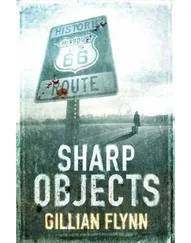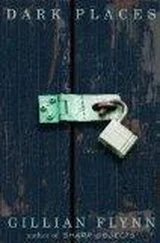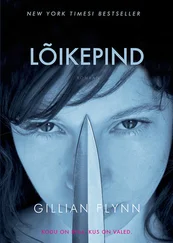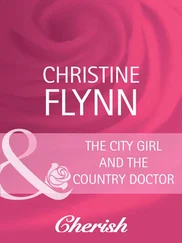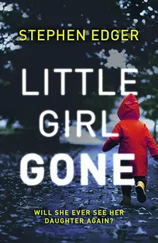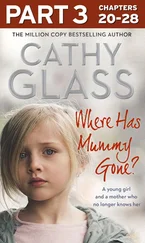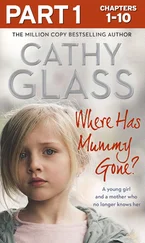“Nick,” Rand Elliott said, spotting me. He took three big strides toward me, and as I braced myself for a punch, he hugged me desperately hard.
“How are you holding up?” he whispered into my neck, and began rocking. Finally, he gave a high-pitched gulp, a swallowed sob, and gripped me by the arms. “We’re going to find Amy, Nick. It can’t go any other way. Believe that, okay?” Rand Elliott held me in his blue stare for a few more seconds, then broke up again—three girlish gasps burst from him like hiccups—and Marybeth moved into the huddle, buried her face in her husband’s armpit.
When we parted, she looked up at me with giant stunned eyes. “It’s just a—just a goddamn night mare,” she said. “How are you, Nick?”
When Marybeth asked How are you , it wasn’t a courtesy, it was an existential question. She studied my face, and I was sure she was studying me, and would continue to note my every thought and action. The Elliotts believed that every trait should be considered, judged, categorized. It all means something, it can all be used. Mom, Dad, Baby, they were three advanced people with three advanced degrees in psychology—they thought more before nine A.M. than most people thought all month. I remember once declining cherry pie at dinner, and Rand cocked his head and said, “Ahh! Iconoclast. Disdains the easy, symbolic patriotism.” And when I tried to laugh it off and said, well, I didn’t like cherry cobbler either, Marybeth touched Rand’s arm: “Because of the divorce. All those comfort foods, the desserts a family eats together, those are just bad memories for Nick.”
It was silly but incredibly sweet, these people spending so much energy trying to figure me out. The answer: I don’t like cherries.
By eleven-thirty, the station was a rolling boil of noise. Phones were ringing, people were yelling across the room. A woman whose name I never caught, whom I registered only as a chattering bobblehead of hair, suddenly made her presence known at my side. I had no idea how long she’d been there: “… and the main point of this, Nick, is just to get people looking for Amy and knowing she has a family who loves her and wants her back. This will be very controlled. Nick, you will need to— Nick?”
“Yep.”
“People will want to hear a quick statement from her husband.”
From across the room, Go was darting toward me. She’d dropped me at the station, then run by The Bar to take care of bar things for thirty minutes, and now she was back, acting like she’d abandoned me for a week, zigzagging between desks, ignoring the young officer who’d clearly been assigned to usher her in, neatly, in a hushed, dignified manner.
“Okay so far?” Go said, squeezing me with one arm, the dude hug. The Dunne kids don’t perform hugs well. Go’s thumb landed on my right nipple. “I wish Mom was here,” she whispered, which was what I’d been thinking. “No news?” she asked when she pulled away.
“Nothing, fucking nothing—”
“You look like you feel awful.”
“I feel like fucking shit.” I was about to say what an idiot I was, not listening to her about the booze.
“I would have finished the bottle too.” She patted my back.
“It’s almost time,” the PR woman said, again appearing magically. “It’s not a bad turnout for a July Fourth weekend.” She started herding us all toward a dismal conference room—aluminum blinds and folding chairs and a clutch of bored reporters—and up onto the platform. I felt like a third-tier speaker at a mediocre convention, me in my business-casual blues, addressing a captive audience of jet-lagged people daydreaming about what they’d eat for lunch. But I could see the journalists perk up when they caught sight of me—let’s say it: a young, decent-looking guy—and then the PR woman placed a cardboard poster on a nearby easel, and it was a blown-up photo of Amy at her most stunning, that face that made you keep double-checking: She can’t be that good-looking, can she? She could, she was, and I stared at the photo of my wife as the cameras snapped photos of me staring at the photo. I thought of that day in New York when I found her again: the blond hair, the back of her head, was all I could see, but I knew it was her, and I saw it as a sign. How many millions of heads had I seen in my life, but I knew this was Amy’s pretty skull floating down Seventh Avenue in front of me. I knew it was her, and that we would be together.
Cameras flashed. I turned away and saw spots. It was surreal. That’s what people always say to describe moments that are merely unusual. I thought: You have no fucking idea what surreal is . My hangover was really warming up now, my left eye throbbing like a heart.
The cameras were clicking, and the two families stood together, all of us with mouths in thin slits, Go the only one looking even close to a real person. The rest of us looked like placeholder humans, bodies that had been dollied in and propped up. Amy, over on her easel, looked more present. We’d all seen these news conferences before—when other women went missing. We were being forced to perform the scene that TV viewers expected: the worried but hopeful family. Caffeine-dazed eyes and ragdoll arms.
My name was being said; the room gave a collective gulp of expectation. Showtime .
When I saw the broadcast later, I didn’t recognize my voice. I barely recognized my face. The booze floating, sludgelike, just beneath the surface of my skin made me look like a fleshy wastrel, just sensuous enough to be disreputable. I had worried about my voice wavering, so I overcorrected and the words came out clipped, like I was reading a stock report. “We just want Amy to get home safe …” Utterly unconvincing, disconnected. I might as well have been reading numbers at random.
Rand Elliott stepped up and tried to save me: “Our daughter, Amy, is a sweetheart of a girl, full of life. She’s our only child, and she’s smart and beautiful and kind. She really is Amazing Amy. And we want her back. Nick wants her back.” He put a hand on my shoulder, wiped his eyes, and I involuntarily turned to steel. My father again: Men don’t cry.
Rand kept talking: “We all want her back where she belongs, with her family. We’ve set up a command center over at the Days Inn …”
The news reports would show Nick Dunne, husband of the missing woman, standing metallically next to his father-in-law, arms crossed, eyes glazed, looking almost bored as Amy’s parents wept. And then worse. My longtime response, the need to remind people I wasn’t a dick, I was a nice guy despite the affectless stare, the haughty, douchebag face.
So there it came, out of nowhere, as Rand begged for his daughter’s return: a killer smile.
AMY ELLIOTT DUNNE
JULY 5, 2010
DIARY ENTRY
I won’t blame Nick. I don’t blame Nick. I refuse—refuse!—to turn into some pert-mouthed, strident angry-girl. I made two promises to myself when I married Nick. One: no dancing-monkey demands. Two: I would never, ever say, Sure, that’s fine by me (if you want to stay out later, if you want to do a boys’ weekend, if you want to do something you want to do) and then punish him for doing what I said was fine by me . I worry I am coming perilously close to violating both of those promises.
But still. It is our third wedding anniversary and I am alone in our apartment, my face all mask-tight from tears because, well, because: Just this afternoon, I get a voice mail from Nick, and I already know it’s going to be bad, I know the second the voice mail begins because I can tell he’s calling from his cell and I can hear men’s voices in the background and a big, roomy gap, like he’s trying to decide what to say, and then I hear his taxi-blurred voice, a voice that is already wet and lazy with booze, and I know I am going to be angry—that quick inhale, the lips going tight, the shoulders up, the I so don’t want to be mad but I’m going to be feeling. Do men not know that feeling? You don’t want to be mad, but you’re obligated to be, almost. Because a rule, a good rule, a nice rule is being broken. Or maybe rule is the wrong word. Protocol? Nicety? But the rule/protocol/nicety—our anniversary—is being broken for a good reason, I understand, I do. The rumors were true: Sixteen writers have been laid off at Nick’s magazine. A third of the staff. Nick has been spared, for now, but of course he feels obliged to take the others out to get drunk. They are men, piled in a cab, heading down Second Avenue, pretending to be brave. A few have gone home to their wives, but a surprising number have stayed out. Nick will spend the night of our anniversary buying these men drinks, going to strip clubs and cheesy bars, flirting with twenty-two-year-olds ( My friend here just got laid off, he could use a hug ). These jobless men will proclaim Nick a great guy as he buys their drinks on a credit card linked to my bank account. Nick will have a grand old time on our anniversary, which he didn’t even mention in the message. Instead, he said, I know we had plans but …
Читать дальше

